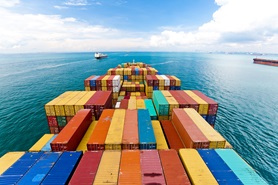ESG Risks Affecting Data Centers: Why Water Resource Use Matters to Investors
Data centers play a critical role for many technology and telecom companies and for their supporting servers, digital storage equipment and network infrastructure for data processing and storage. Data centers require high volumes of water directly for cooling purposes and indirectly, through electricity generation. Morningstar Sustainalytics’ recent activation of the Resource Use Material ESG Issue (MEI) within its ESG Risk Ratings recognizes water risks of data centers.
Impact of US Supreme Court’s EPA Ruling on US Utilities’ Carbon Exposure
The Clean Power Plan was created using a directive from the Clean Air Act that enabled the EPA to set emission limits for air pollutants based on the best available technology to reduce emissions. The EPA aimed to cap carbon emissions and curb greenhouse (GHG) emissions by changing the composition of the existing operational power generation assets by forcing the closure of coal plants through strict emission caps, resulting in a system-wide transition to renewable energy.
Why ESG Investors Follow the Elon Musk Twitter Takeover
A self-proclaimed “free speech absolutist”, Musk has criticized what he views as excessive moderation on online platforms, indicating his desire to ease Twitter’s content moderation policies and only remove content deemed illegal by governments.
Ocean Carriers Facing Increased ESG Risk Amidst Supply Chain Crisis
Maritime shipping is the most common mode of transport for global trade, with around 80-90% of the volume of international trade in goods carried by sea. Complex supply chain challenges around the world made 2021 an exceptionally challenging year for retailers, exacerbating global inflation. Still, it was also very profitable for ocean carriers and containership owners.
Cobalt ESG Risks Threaten Electric Vehicle Supply Chain
Transport electrification is at the forefront of the international climate transition agenda. Because of this, global demand for cobalt is projected to grow fourfold by 2030, which raises the question, are mineral supply chains robust enough to fuel a sustainable EV revolution?
Correlation of Business Ethics and Corporate Culture - 5 Lessons from the Banking Industry
To protect a company’s reputation and economic position, its employees play an essential part in organisational risk mitigation strategy by demonstrating consideration for systemic business risk, taking accountability, and being willing to escalate concerns. Companies with a strong, ethical corporate culture have much to gain—improved employee performance, morale, and retention, and in the long run, bolstering the bottom line.
Sustainable Investment Calculations Under MiFID II and SFDR Remain Perplexing for ESG Investors
The various interpretations of the sustainable investment definition introduced by the SFDR and leveraged in MiFID II leave many market participants unsettled, having to decide between approaches that have different benefits and limitations in the short to medium term.
The Governance of Autonomous Weapons: What Investors Should Know
The ethical implications of lethal autonomous weapons systems (LAWS), often referred to by their dramatic moniker ‘killer robots’, have long been a topic of interest. Until recently, debates about LAWS were relegated as hypothetical, with the technology assumed to be under development and out of reach. Such assumptions may be due for reevaluation, and while a firm conclusion is yet to be drawn, it is worthwhile presenting them to the ESG investment community.
ESG Implications of Russia’s Invasion of Ukraine on the Automotive Industry
The Russia-Ukraine conflict has put more pressure on a sector that was already constrained by the disrupted supply chains, brought about by pandemic-induced congestions and shortages. Additionally, the surge in fuel price is already affecting customers, although it may accelerate the adoption of electric vehicles (EVs) as a side effect. However, the scarcity of minerals, which are necessary for semiconductor manufacturing, may further exacerbate the chip shortage that has afflicted the automotive industry since 2020.
Russia-Ukraine Crisis Could Spell Unforeseen ESG Risks for Insurers
The Russia-Ukraine conflict and the subsequent sanctions on Russian entities have led to material and wide-ranging impacts on diversified sectors and international firms. However, company disclosures and other sources suggest that the conflict’s primary impact on the global insurance industry is limited for two main reasons
ESG Implications of Russia’s Invasion of Ukraine on the Aviation and Defense Sectors
The aviation industry is feeling the impact of rising fuel costs as an immediate repercussion of the conflict in Ukraine. In particular, the airline sector is still facing significant challenges in mounting a steady recovery from the COVID-19 crisis. On the other hand, the defense industry may be presented with opportunities in light of increased government spending in the aftermath of the invasion.
Banks’ ESG Risks Related to the Russia-Ukraine Conflict on Investors’ Radars
Investor interest in the banking sector remains high as the impact of Russian sanctions unfolds. Based on Morningstar Sustainalytics’ research, total unmanaged risk has increased for both Russian and international banks with exposure to Russian clients. To what extent have sanctions affected banks’ total unmanaged risk?
Leveraging Blockchain to Improve Supply Chain Management - A Case Study for Household and Personal Products Companies
With growing scrutiny from stakeholders—international regulators and regional governments, NGOs, the general public, investors, and financial institutions—companies accused of human rights violations and environmental damage in their supply chains face substantial risks.
ESG Impacts of the War in Ukraine: Global Food Supply
The invasion of Ukraine highlights the fragility of the global food system. The destruction caused by the war and subsequent trade restrictions on Russia, endangers a significant percentage of the global food supply coming from two of world’s leading agricultural commodity exporters, consequently prompting food prices to surpass the 30-year high.
Biodiversity loss and climate change call for a nature-positive economy – Stewardship may lead the way
Financial institutions funding the supply chains affected by biodiversity loss stand to lose right alongside farmers, producers and retailers—and so, in turn, do investors. ESG stewardship continues to be a powerful investor instrument to mitigate risks on a changing planet. With growing expectations of double materiality, it is an opportunity for investors to have a greater societal impact and support the transition towards a nature-positive economy.




















